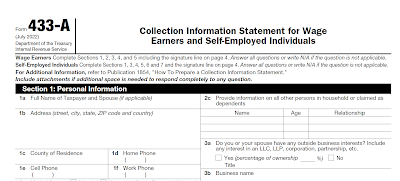Cryptocurrency is being targeted by the IRS as evidenced by the April 13, 2021, hearing of the Senate Finance Committee, Sen. Rob Portman (R-OH) and IRS Commissioner Charles Rettig discussed issues relating to the reporting of cryptocurrency transactions.
Commissioner Rettig specifically highlighted new cryptocurrency disclosure obligations on the Form 1040 tax return and has it listed on the IRS' "Dirty Dozen" list.
Preparing and undergoing a tax examination for Crypto can be
exhausting, but hopefully, this post will help you prepare to survive an IRS
Crypto Currency Audit.
What Information Will I
Need For A Cryptocurrency Audit?
During an audit, it’s likely
that the IRS will ask you for the following information:
- All blockchain addresses and
wallet IDs that you own/control
- All crypto exchanges and
wallets you are using, as well as your user IDs, email addresses, and IP
addresses related to those accounts.
You’ll also need the
following information on each one of your cryptocurrency transactions.
- The date and time each unit of
your cryptocurrency was acquired
- The fair market value of each
cryptocurrency at the time of acquisition
- The date and time of each time
you disposed of your cryptocurrency
- The fair market value of each
cryptocurrency at the time of disposal, and what you’ve received in
exchange for each cryptocurrency
- The accounting method that you
used to calculate your capital gains at each disposal event
How Do You Hold Your Cryptocurrency?
A cryptocurrency wallet that cannot be compromised because it is not connected to the Internet. Also called a "hardware wallet" and "offline wallet," the cold wallet stores the user's address and private key and works in conjunction with compatible software in the computer. Contrast with "hot wallet," which resides in the user's desktop or mobile device or in a cloud-based service, all of which are online to the Internet and can be hacked.
While you may think this information is not discoverable, you should think again the IRS not only requires reporting of crypto currency by crypto currency exchanges, but they also have frequently summoned the information on accounts > $20,000 at least four times and as recently as Aug. 15, 2022 when they issued a John Doe Summons To SFOX Seeking the Identities of U.S. Taxpayers Who Have Used Cryptocurrency.
Review the Crypto
Audit IDR
When you receive a notice of examination from
the IRS, they will also receive an IDR which is an Information Document
Request. Some IDRs are relatively short and others can be more extensive. Therefore, when
you are under a crypto audit, the first step always is to evaluate the IDR to
determine what the IRS is asking for, so that you can make notes as to what
you’ll need to respond and prepare a strategy of how to respond.
How Far Back Does A
Cryptocurrency Audit Go?
Audits include all tax returns that are filed
in the last three years for overstatement of deductions or six years
for substantial understatement of income. (Though they typically don’t go
back further than six years).
If no return was filed, or a fraudulent return is filed, there is no limit to
how far back the IRS can audit.
Frequently Asked
Questions
To summarize what we’ve discussed we have
provided a few frequently asked questions about cryptocurrency tax
audits.
- Can you get audited for
cryptocurrency?
Yes. If the IRS has reason to believe that you are underreporting your crypto taxes, it is likely that they will initiate an audit. - How long does a crypto tax audit
typically take?
The maximum length of an audit is generally 3 years. However, the length of a crypto tax audit can vary heavily depending on the specifics of your situation. - How do you avoid a cryptocurrency tax
audit?
To minimize your chances of being audited, be sure to accurately report your cryptocurrency capital gains and income across all your wallets and exchanges.
- Which Crypto Exchanges Do Not Report To
The IRS?
To legally operate in the United States, all major cryptocurrency exchanges are required to abide by relevant IRS reporting requirements. - More FAQ's regarding cryptocurrency?
Go to the IRS' webpage.
Unreported
Cryptocurrency?
About 1-2 years ago, the
IRS stated it would not be developing a “stand-alone” cryptocurrency voluntary
disclosure program, but no such program currently exists.
Hybrid Offshore
Accounts (Did You Report on Forms 114 & 8938)
Currently, holding cryptocurrency does not require you file an FBAR filing on a FinCEN 114. Similarly, it also does not require a Form 8938.
It's not clear whether an FBAR is part of reporting
requirements for U.S. investors who have traded virtual currencies on
internationally-based exchanges. This is because there's no definitive guidance
that accounts on exchanges count as "international bank
accounts."
However, on 31st December 2020, the IRS quietly
dropped a Bitcoin bombshell as it released a statement saying that “FinCEN
intends to propose to amend the regulations implementing the Bank Secrecy Act
(BSA) regarding reports of foreign financial accounts (FBAR) to include virtual
currency as a type of reportable account.” This regulation will apply to
accounts on foreign crypto exchanges as well. Thus, a conservative approach
would be to file an FBAR if at any time you held $10,000 or more in one or more
internationally based accounts during the tax year.
Note that this total is not for a single account, but
for all foreign accounts. For example, if you held $6,500 of ETH on Bitfinex
(Taiwan) and $5,000 of LTC on KuCoin (Hong Kong), you might need to file an
FBAR for each account.
Should I Seek The Help
of A Tax Attorney Like TaxAid?
Yes, many investors choose to
seek the help of a tax attorney that can advocate their tax positions before
the IRS.
- If you choose to hire a tax professional, be sure that the tax attorney who you work with
has a strong background in cryptocurrency, like Marini & Associates, PA -
TaxAid.com.
- We have experience in representing taxpayers with cryptocurrency tax issues.
- We know how to use various cryptocurrency tax software.
- The tax attorneys
at Marini & Associates, PA (TaxAid.com), will meet with the IRS
on your behalf, so you don't have to. and
- If you are out of cryptocurrency tax and reporting compliance, we can also advise you of the benefits of a domestic or offshore Voluntary Disclosure, which we handle on a regular basis.
Sources















